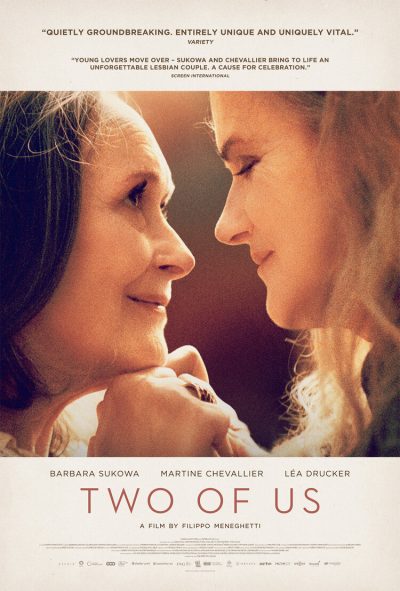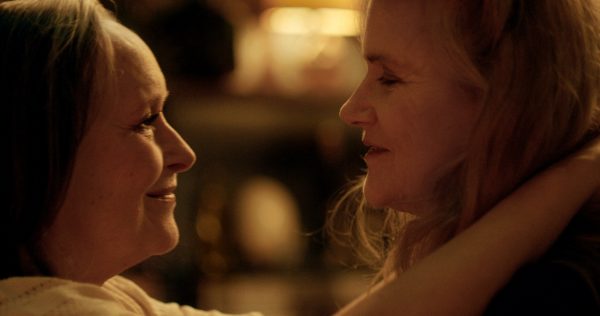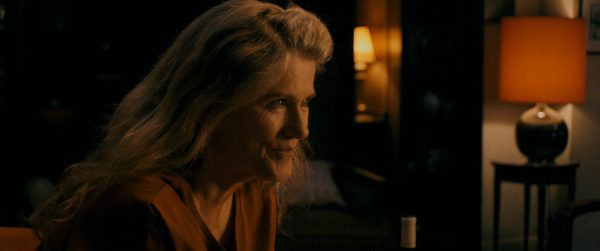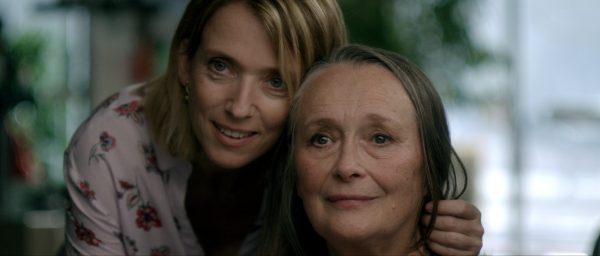‘Two of Us’ explores the depths of the power of love
“Two of Us” (“Deux”) (2019 production, 2021 release). Cast: Barbara Sukowa, Martine Chevallier, Léa Drucker, Jérôme Varanfrain, Muriel Bénazéraf, Augustine Reyes, Hervé Sogne. Director: Filippo Meneghetti. Screenplay: Malysone Bovorasmy, Filippo Meneghetti and Florence Vignon. Web site. Trailer.

We’ve all been led to believe that “Love conquers all.” But is that really the case? Aren’t there situations that arise where, no matter how much love is present, it can’t solve every problem that arises? And, if so, then what? How can circumstances be resolved satisfactorily? Such is the dilemma raised in the heartwarming and heartbreaking new French love story, “Two of Us” (“Deux”).
Madeleine Girard (Martine Chevallier) and Nina Dorn (Barbara Sukowa) have been in love for years. They met while on vacation in Rome, and now, as they’re ready for retirement, Madeleine plans to sell her Paris apartment so that they can return to the Eternal City to live out their golden years together. There’s just one catch: Before Madeleine took up with Nina, she was married and had two children, and, after her husband died, she never told them about her same-sex relationship, even now as Anne (Léa Drucker) and Frédéric (Jérôme Varanfrain) have reached adulthood. They’re aware of their mother’s “friendship” with Nina, believing her to be Madeleine’s neighbor from across the hall, but they have no clue about the true nature of the connection between the two women. And that apartment across the hall is merely a safety valve, a sparsely furnished place for Nina to retreat to when the need arises, such as when Madeleine’s children come to visit.
Madeleine’s reluctance to come out to Anne and Frédéric has long been a source of contention between the partners. Nina has been open about her sexuality for years (except, of course, when around Madeleine’s family), and this difference in attitude has been an ongoing source of frustration for her, making Nina feel as though she has to walk on eggshells and artificially hide her true self when called upon. Nina’s encouraged, though, when Madeleine reveals that, due to the impending sale of her apartment, she plans to tell her children the truth about herself.
So why hasn’t Madeleine said anything to Anne and Frédéric previously? As someone who grew up at a time when opening up about one’s homosexuality was a risky proposition, she’s never been able to shed her hesitancy about violating this once-powerful taboo, despite society’s greater acceptance of the idea in recent years. In many ways, this truly is a case of not being able to teach an old dog new tricks. But there’s more to it than that; Anne and Frédéric have come to believe that their late father truly was their mother’s one and only great love, and Madeleine has not been able to bring herself to say anything that would shatter that illusion.
However, with such a big change now pending in Madeleine’s life, she feels she has to say something, and she decides to do so at her birthday dinner with Anne and Frédéric, as well as her grandson, Théo (Augustine Reyes), Anne’s son. But, when the time comes to open up, Madeleine backs down, and, when she tells Nina about this, she’s furious. They have a bitter argument, one that leaves their future in doubt and Madeleine shaking.

That future is quickly left in even greater doubt when Madeleine suffers a debilitating stroke, leaving her largely immobilized and completely unable to speak. Nina is ridden with guilt, believing that her angry outburst may have caused or contributed to the incident. She naturally wants to take care of Madeleine, partly to atone for behavior, but, more than anything else, because her partner is the one she loves. However, given that Madeline never told Anne and Frédéric about Nina, she’s quickly pushed to the sidelines. Madeleine’s children know nothing about the relationship and believe that Nina is nothing more than their mother’s friend and neighbor. So, when it comes to making decisions about Madeleine’s care, Nina suddenly finds herself out of the loop; those determinations are now in Anne and Frédéric’s hands, and about all Nina can do is sit back and watch.
Needless to say, this situation is unacceptable to Nina. She feels a need to be more involved, and, once Madeleine comes home, she looks for ways to do so. However, once again, since the truth of the relationship has been kept from Anne and Frédéric, she’s unable to have much say, especially once the children hire a home caretaker, Muriel (Muriel Bénazéraf), to attend to their mother. Nina slowly ingratiates herself with Anne and Muriel, looking for ways to provide friendly assistance, help that they welcome, at least in limited ways, and only under certain circumstances.
It’s during these brief times together that Nina comes to realize just how much she loves her partner. She misses the everyday ongoing contact with Madeleine that she had grown so accustomed to, and she wants it back, despite her depleted condition. However, how can Nina get past the gatekeepers who are restricting her access and who know nothing about the true nature of her relationship with their mother and patient? That’s the situation that’s about to unfold, marked by the emergence of an increasingly contentious scenario with much at stake. Is there enough love involved to overcome these trying circumstances? Can everyone’s needs be addressed? And will the truth at last come out?
In shaping the life we want for ourselves, honesty and authenticity generally win the day. That’s because those qualities reflect our true feelings, our beliefs about how we see ourselves. And those beliefs, in turn, are responsible for manifesting the existence we experience, a product of the conscious creation process, the philosophy based on that principle.

Such notions are particularly important in matters of love, as they fuel the qualities and integrity of our relationships. In fact, in many respects, they’re what makes our romances succeed and flourish. This principle affects all aspects of our relationships, such as our connections to those around us, like family and friends. When we’re honest about our loves with those who care about us, it further enriches the quality of our romantic bonds, largely because everything is above board, with nothing hidden.
Unfortunately, that’s where Madeleine and Nina have gotten themselves into trouble. Madeleine’s inability to come forward about her true self has strained her relationship with Nina. In some ways, that hiding has also harmed her connection with Anne, Frédéric and even Théo. Since she’s not able to bring herself to be forthcoming with her family, her lack of truthfulness hurts her bond with them, almost as much as it does her relationship with Nina.
Madeleine’s reluctance in coming out is obviously rooted in fear, which is a belief in itself, one that often has powerful manifestation capabilities inherent in it. She grew up with the frightfulness that was often associated with stepping forward about one’s sexuality, and it’s likely that she hasn’t been able to rid herself of that apprehension, despite the emergence of greater tolerance in recent years. But, just as important, there’s the fear of disappointing and disillusioning her children, not only about her orientation, but also about the nature of her relationship with their father. She can’t bring herself to shatter that image out of fear that it will permanently damage her relationship with them. Of course, the more she holds on to that belief, the more ingrained those circumstances become, making it ever more difficult for her to change.
Getting past those fears and the limitations that they’ve imposed upon her is crucial if she ever hopes to find true contentedness and inner peace. Should she fail in this, she runs the risk of losing the love she’s forged with Nina. It also threatens to keep her relationship with Anne, Frédéric and Théo on tentative terms, preventing those bonds from blossoming and reaching their true, fullest potential. Admittedly, taking such a big step requires a leap of faith, a willingness to embrace beliefs that will take Madeleine into uncharted territory, but it’s territory that holds the promise of even greater fulfillment than she’s ever experienced, both with Nina and her own family. It’s an act of heroism that can yield tremendous rewards, benefits that can potentially go far beyond anything imagined.

If Madeleine is worried about what’s called for, she should consider taking a cue from our divine collaborator in the conscious creation process, the loving force of the Universe (or All That Is, God, Goddess, Source or whatever other name one chooses). That love is a source of unconditional support for our endeavors, helping us to make possible what we seek. However, our collaborator requires clarity from us in the belief department; It must have an unfettered handle on what we want, because, if the beliefs are tainted by contradictions or muddled by a lack of precision, It won’t know what to provide, keeping us from attaining what we hope to achieve.
For example, if we try to convince our collaborator that we want an open, honest relationship but simultaneously intentionally seek to keep aspects of it concealed, that’s a contradictory belief mix primed for trouble. One can see that, for instance, in the argument between Madeleine and Nina. The long-simmering frustration that has been brewing for some time finally surfaces, despite the depths of the love between them, and it threatens to destroy everything they’ve built together. Is an outcome like that really worth it? That’s something to consider before formulating the beliefs we need to make our hoped-for results materialize. And, in a matter as important as love, that can’t be emphasized enough.
How and who we love has undergone tremendously liberating changes in recent years, but, for some seniors, who remember a time when such tolerance was absent, the past painfully lingers on into the present. Director Filippo Meneghetti’s debut narrative feature brings this to light in his intensely gripping and moving work, one that grabs viewers by the collar and makes the frustration experienced by its protagonists truly palpable – and quietly infuriating. The superb performances by Sukowa and Chevallier are riveting and heartfelt, achieving powerful impact with gestures as simple as facial expressions and piercing views into their eyes. There are a few incidents in the narrative that seem a bit far-fetched, especially in the film’s second half, but they’re compensated for by everything else this release has to offer. The pain and warmth of this one must be experienced by anyone with a conscience – or a pulse – to see that, no matter how far we have come, there’s always more ground still to be made up. This Golden Globe and Critics Choice Award nominee for best foreign language film is available for online streaming.
Despite the prevalence of love around us, it’s sometimes mystifying why it seems so hard to find, as anyone who has perused dating sites can probably attest. And, because of that, we should make it a point to cherish it with all our might when we find it, to do what we can to cultivate and nourish it so that it can bloom without reservation. That, of course, starts with us and how we view it, beginning with the beliefs that help to bring it into being in the first place. Once we realize that, we may be a lot less likely to get in our own way and keep such a magnificent gift from coming our way.
Copyright © 2021, by Brent Marchant. All rights reserved.



